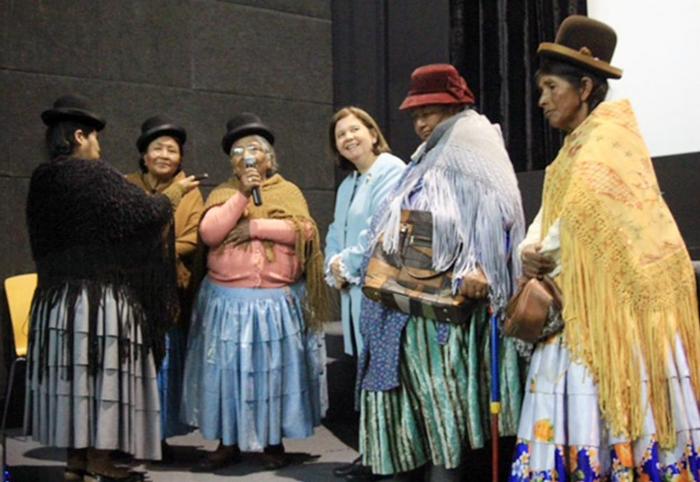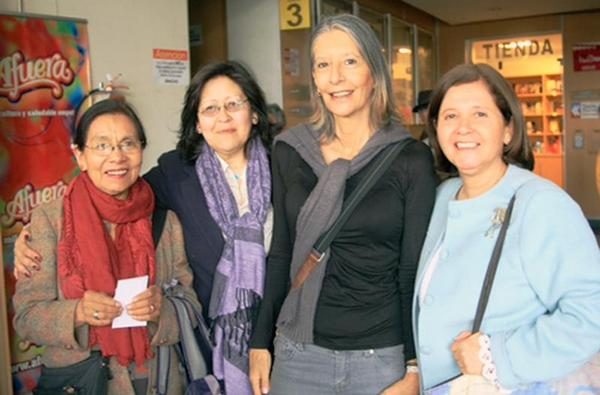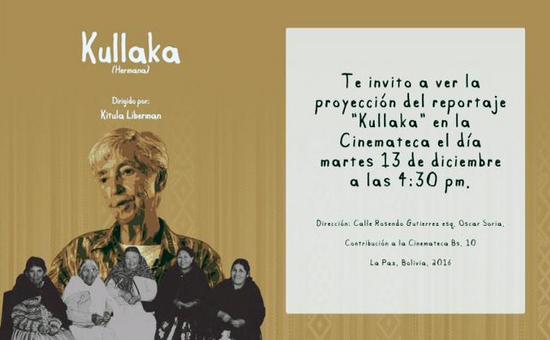A Film Review: Kullaka
Posted on March 1, 2017, by Mary Peter Bruce SL

Photo courtesy of Mary Peter Bruce
“During the 1970s, Bolivia went through many social and political conflicts. At that time several groups, religious and laypeople, went to volunteer in the rural area near La Paz.
“They worked as a pastoral team of the Catholic Church in the Bolivian Altiplano. Their services included health, education, communication and special programs for women’s promotion.” (from the Kullaka movie script)
In 1974 Maryknoll Father Don Steed invited me to work for Radio San Gabriel, which belonged to his congregation. Five young Aymara women and I entered into a pioneer service in the field of pastoral communication by means of a radio station and catechetical work especially for women, their communities and society in general. Three of these young women and I worked together until 1978.
The film’s producer/director Kitula Liberman became a friend to the young Aymara women when she would go to the Altiplano on weekends during her high school years. Kullaka, a 42-minute documentary film, is about the collaborative effort that grew for seven friends — the five young women, Kitula and me — who became as close as sisters. The title Kullaka means “sister” in Aymara.

Photo courtesy of Mary Peter Bruce
Several Aymara women — Eva Ana Gutiérrez, Lina Cazas, Eusebia López and Calixta Canaviri — and I joined forces and formed a team. After that, the women who had joined me continued the work.
After graduation from high school, Liberman studied anthropology in Mexico. On my visit to Bolivia in 2014, Liberman and I met for an afternoon of conversation as old friends. During our afternoon, Liberman interviewed me about the 1970s radio work. She then worked on her vision to tell the story. Two years later she finished the production of Kullaka, a documentary about the work.
The film shows five aspects of the life Aymara women live today.
• Eva Ana Gutiérrez has worked for Radio San Gabriel more than 40 years, and educated five children, even after her husband walked away with a younger woman.
• Encarnación Huanca married Calixto Quispe one month before his ordination as a priest. He was ordained a deacon and they both served the Church. Marriage is almost essential in Aymara culture.
• Calixta Canaviri never married, but has a handsome young son. She and her friend Lina Cazas walked 20 miles to Viacha for their first course offered by a team that included me. I had not yet envisioned the radio station where later they would work. After retiring from Radio San Gabriel, Calixta bought land in her village and now cares for her animals.
• Lina Cazas is using a new invention, a small machine that spins the wool into thread and a tub that will roll it. She and her husband have grown old together. Though they were not able to conceive, they have a loving adopted daughter, Nelly.

Photo courtesy of Mary Peter Bruce
• Eusebia López married Luis. They had two children. A few years ago, someone killed Luis and stole his car. Years before, the couple helped me understand marriage, their faith and their kindness, the spirit of community and married life. Later, she also became a good friend to Vicki Quatmann.
Kullaka connects the women and their life today through the interview Liberman had with me in 2014. Liberman was able to successfully hold the premiere in 2016 in La Paz.
I am translating the film script and hope that there will be interest to see this wonderful film. It was scheduled to be shown at the Motherhouse Feb. 21.
